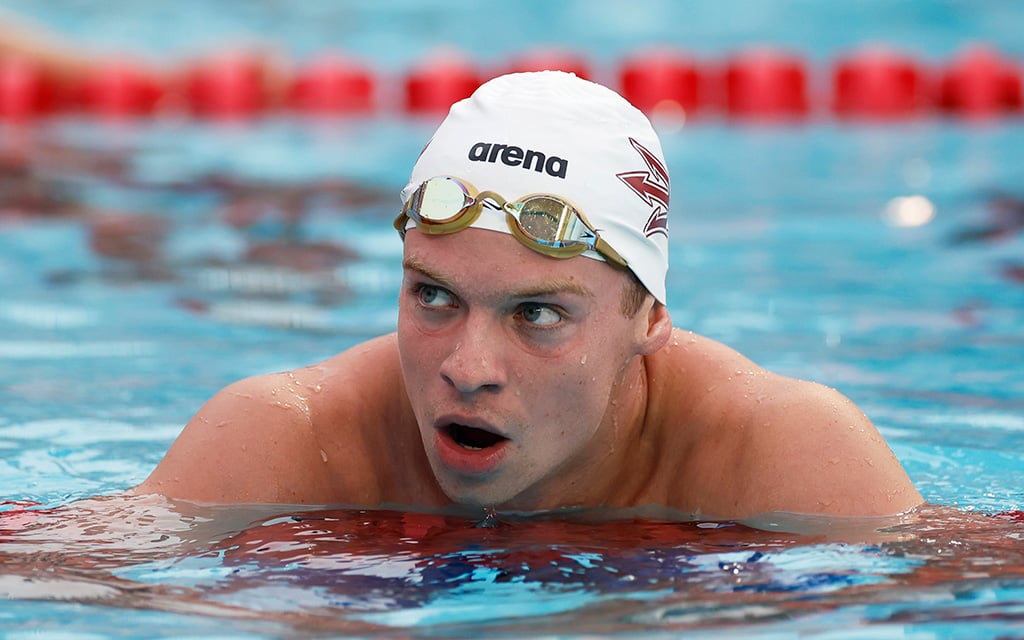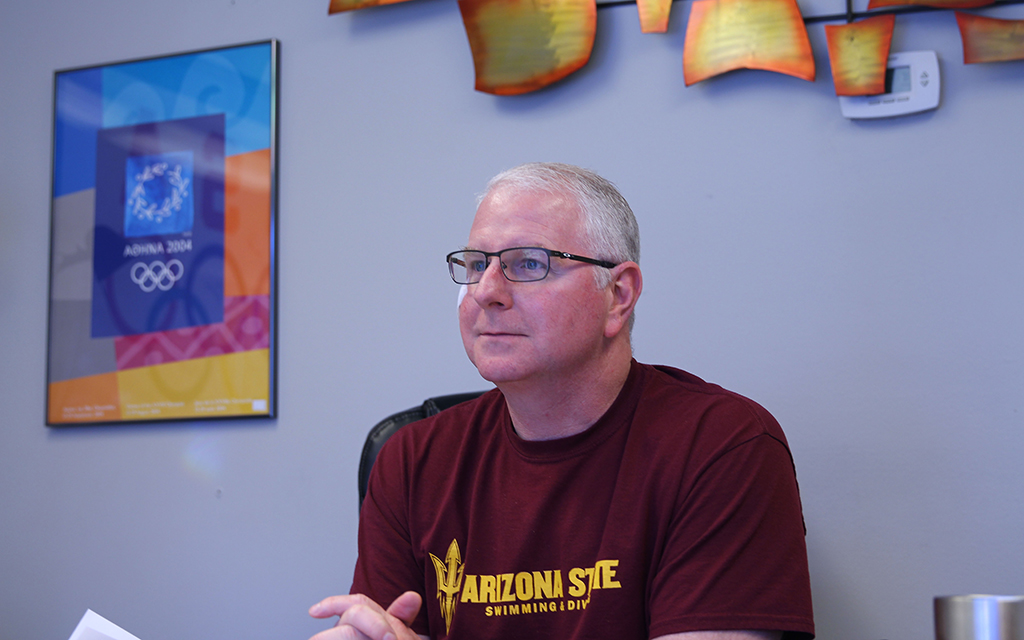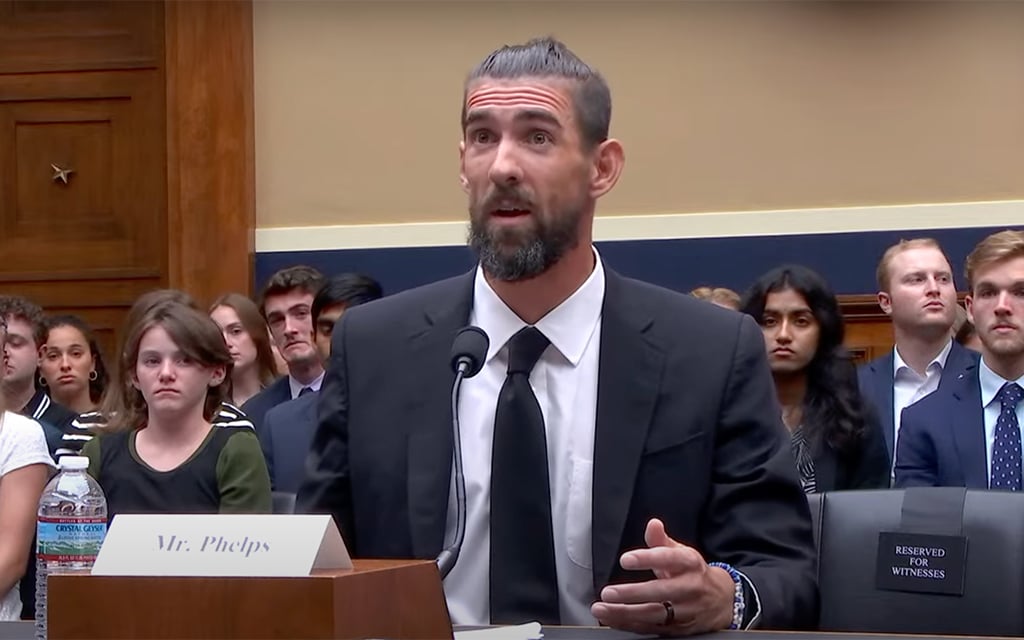
Leon Marchand has returned to his hometown of Toulouse, France, to train before an Olympics that will feature an international spotlight. (Photo by Sarah Stier/Getty Images)
PARIS – Nearly 400 miles south of Paris, in a city known for its foie gras but also its booming aerospace industry, several swimming coaches are quietly fine-tuning their not-so-secret weapon.
Former Arizona State swimmer Léon Marchand has returned home to Toulouse to prepare for the biggest stage in the world, the Paris Olympics
“We are trying to protect him from everything,” said Nicolas Castel, his coach at the Les Dauphins du TOEC swim club in Toulouse. “We want him to focus on what he has to do.”
Part of that protection might involved avoiding questions about Michael Phelps. The comparisons are hard to ignore.
In the 2000 Sydney Games, 15-year-old Phelps participated in his first Olympics. Although he won no medals that year, his Olympics journey revealed one of the greatest athletes ever across all sports. Four years later, at the Athens Games, his dominance began with eight medals, six of them gold, and he would go on to own the sport for nearly two decades.
Fast forward nearly a quarter century after the Sydney Games, and we see history potentially repeating itself. French swimmer Marchand, much like Phelps, is gearing up for his second Olympics. Could he be the next big star in swimming and all Olympic sports? The former ASU swimmer is on track to do so.
“I’m really confident,” Marchand said. “I think I can do it. If I’m not, it’s OK. I will prepare for the next one. But I think this is the right time to do it.”
Born in Toulouse in the south of France, Marchand has been a rising star in swimming over the last two Olympic cycles. It’s in his blood. His father, Xavier Marchand, was a former Olympic swimmer and world silver medalist. His mother, Céline Bonnet, is a French record-holder in the sport.
Like Phelps, Marchand made his Olympics debut at 19. He also did not win a medal in those 2020 Tokyo Olympics after competing in three relays, one of which was in the finals, and the men’s 200-meter butterfly.
Since then, Marchand has become a swimming superstar. Following the Tokyo games, he joined the ASU swim and dive team to train under highly touted coach Bob Bowman, who was Phelp’s coach during his dominance and has since moved on to the University of Texas. At ASU, Marchand became one of the greatest athletes to wear the maroon and gold, culminating when he and the team won the 2024 NCAA championships for the first time in school history.
Marchand broke NCAA records in almost every event he swam in college. He holds records for the 200 individual medley (1:36.34), 200 breaststroke (1:46.35), 500 freestyle (4:02.31) and was on relays for the 400 medley (2:57.32) and freestyle (2:42.40) records. Above all, he broke Phelps’ 400 individual medley record in 2023 at the world championships with a 4:02.50.
And standing there by his side on the podium, raising his hand and giving him his medal after breaking the more than 20-year-old record, was the man whose footsteps he had been following: Michael Phelps.
“It’s just crazy,” Marchand said after his record-setting race. “It’s just insane to do it here. I’ve watched so many races of (Phelps’). It’s crazy to meet him at first and then to break his record.”
Marchand’s legacy at ASU will last a long time. In his years with the program, he broke 11 school records, seven of which were individual events.
ASU swim and dive team coach Herbie Behm worked extensively with Marchand and all of the program’s Olympians. Behm, an accomplished coach and former ASU swimmer, has seen many skilled athletes train in the waters at Mona Plummer Aquatic Center in Tempe. None of them have practiced quite at Marchand’s level.
“There’s a couple of times when he was doing sets of 500s in practice and on, like, a 4:30 interval and descended down to 4:17,” Behm said. “He’s doing crazy, crazy stuff in practice. … He has such a wide range of skills that it makes sense he’s one of the best 400 IM’ers of all time.”
In addition to breaking record after record at the school, Marchand academically pushed himself, which helped set a standard for the entire team.
During the spring, his final semester attending ASU, he took a staggering 18 credits toward a computer science degree “while shattering records and resetting the entire NCAA record book,” Behm said. “He’s doing a lot more than just working hard in the pool. He’s a very impressive human being.”
Marchand’s success didn’t come from just himself, however. Behm largely credits the atmosphere created by the right coaches.
“That only happens when the environment is ripe,” Behm said. “He’s the pinnacle of what can be done, but the environment has to be right. So it’s kind of what everybody’s helped build here.”
Marchand could go down in history as ASU’s best-ever athlete, even if he becomes an all-time great Olympian. That would mean more exposure for his alma mater overseas.
“Léon being at the Olympics means a lot of things (for us),” ASU athletic director Graham Rossini said. “We’re committed to developing excellence in all the ways we can, and Léon is shining a wonderful magnifying glass on all the great things happening at ASU.”
The newfound exposure has already paid dividends for the university. An ASU student recently told Rossini that while studying abroad in Argentina this summer, he met some women from France who knew about Léon and his swimming accolades at ASU.
“It’s a cool example of how sports can connect the world,” Rossini said. “Here are young women in France who know about ASU.”
With all his accomplishments during his time in Tempe and at the world championships in 2023, Marchand now has the chance to do something even Phelps didn’t do: win gold and break records in his home country.
Following the NCAA championships, Marchand announced that he would leave ASU to turn pro and prepare for the 2024 Paris Olympics. Bowman said he would follow him and be a part of the French national team staff to coach Marchand through the games.
Marchand’s success has all eyes on him heading to Paris, but he and Bowman know that the Olympics brings a different type of pressure.
“The challenge of the Olympics is not necessarily swimming the events,” Bowman said in May. “Number one, (he’s) got to learn how to block out some noise because there will be constant noise. (He) has to learn how to adapt when things pop up. You can’t expect it to be some dream sequence of events where you just go, and it happens. We’ve talked about it for years now and what that challenge is going to be like.”
Bowman’s experience coaching Phelps and other world stars has Marchand in the right place to succeed as the two head for his homecoming. But the hope for greatness comes with mountains of pressure, so Marchand returned to Toulouse after leaving the U.S. to help block out the noise before the Paris games.
“I didn’t really go out in public to Toulouse,” Marchand said during a press conference in June. “I was in my family cocoon. I’m still trying to take it step by step. It’s true that since returning to France, I’ve thought more and more about Paris with the media, with the pressure, with the people who talk to me about it.”
Pressure and expectations will always follow athletes who pursue greatness, especially at the level Marchand hopes to achieve. Phelps dealt with the same pressures throughout his career, and now it’s time for Marchand to face the same challenges. Just getting to this stage takes “a lifetime of work,” Behm said.
Marchand has been following the trail left by Phelps back in the 2000s when he made his Olympic debut and found gold for the first time in 2004. Now, the Frenchman will have a chance to reach the mountaintop in his home country and begin his Olympic legend at the 2024 Paris Olympics.

